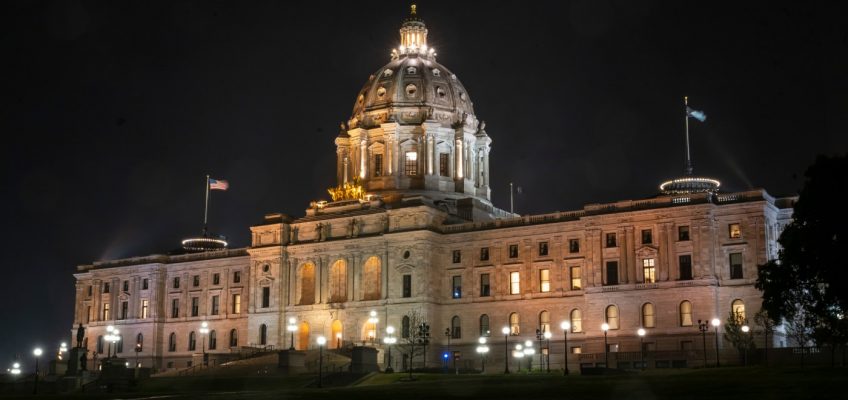Lawmakers continued trying to piece together Minnesota’s next two-year budget on Wednesday, though details of the process remained largely behind closed doors.
Only one bill that’s part of the $66 billion budget framework deal is getting public hearings so far: taxes. Other meetings on the dozen or so bills legislators need to pass aren’t publicly posted or open to the public.
Since lawmakers didn’t finish a budget by the May 19 deadline, they’re meeting in “working groups” to get bills in shape before returning for a special session to pass a budget.
Major areas of the budget, like the K-12 education and health bills that account for about two-thirds of state spending, are still incomplete. Transportation and higher education also still need work.
‘Working groups’ leave public in the dark
Leaders say they hope a special session could happen as soon as the end of the week, or possibly following the Memorial Day weekend.
Members of the House tied between Republican and Democratic-Farmer-Labor members and the one-seat DFL-majority Senate are working on remaining bills in private discussions to hash out final details before Gov. Tim Walz calls them back to the Capitol.
Since they aren’t in session, they are instead meeting for working groups rather than as full-fledged committees. Much like the overarching budget negotiations between the governor and legislative leaders earlier this month, the public is in the dark about what’s happening during these discussions.
When it comes to the groups currently developing budget bills, Matt Ehling, a board member with Minnesotans for Open Government, said putting key decisions behind closed doors can obscure who or what influenced decisions.
“Having more access to the process would allow the public to see what legislators are weighing and what they’re not weighing,” he said. “The rationale is often as important as the outcome.”
Ehling said it’s during this part of the process where the public loses sight of how state leaders make decisions. There may have been public hearings on many bills in the past few months, but now the leaders go underground and emerge with a deal which they then sign off on with limited discussion in a public committee.
“They basically have created a situation where they block out the public from being able to weigh in on these issues,” said Hamline University political science professor David Schultz. “These are working groups. They’re not official. It’s just a way of avoiding transparency and avoiding accountability.”
Budget ‘deal’
There also isn’t any publicly available document with complete details on the deal between Walz and legislative leaders. Most of the information has come in the form of statements from officials. And the information hasn’t always been complete.
For example, Republican House Speaker Lisa Demuth made it seem like cuts to state aid for private schools are off the table, while House DFL leader Melissa Hortman has told reporters that they remain subject to negotiations.
A cut to the state family and medical leave payroll tax touted by Demuth as part of the deal turned out to be a decrease to a cap on the maximum rate.
Meanwhile, lawmakers working on the taxes bill weren’t in complete agreement Tuesday about how the agreement would shape their decision-making. Sen. Ann Rest, DFL-New Hope, said they’d seek further guidance from leaders on how to proceed.
Schultz said leaving the details of the global budget agreement externally vague serves a useful purpose for legislators who will have to make difficult compromises.
He called the budget agreement announced by the governor, Senate DFL Majority Leader Erin Murphy and leaders in the 67-67 tied House last Thursday more of a “framework” than a “deal.”
“By keeping it so general, it … gives each side an ability to spin the deal in a way that most favors them,” he said. “If you put too much detail into it, you might not be able to sell the deal to either the rest of your members of your party, or to your supporters or to the voters.”
Toward compromise
At least for the top-level agreements, Hortman said private meetings between leaders and the governor are the best way to arrive at a compromise before delegating work to different committees. Things didn’t work as well when cameras were in the room during past administrations, she said.
“You need people to be able to say what’s their bottom line and to make their emotional pitch and to say where their caucuses are and say where their votes are,” Hortman told reporters Monday. “People have to really show their cards. So that is a space that has not ever and probably will not ever be transparent.”
Lawmakers and the governor have to finish the budget by June 30 or the state government shuts down. Committee leads had until 5 p.m. Wednesday to finish their work.
Hortman told reporters Monday that she and other leaders could get involved with the process if there weren’t any agreements by that time.
Related Articles
Legislature begins work on budget deal ahead of special session
MN Legislature: Pension changes for teachers goes to governor to sign
Big pieces of MN budget unfinished; Legislature to return for special session
Former state legislator Melisa López Franzen ends campaign for U.S. Senate
MN Legislature sends Stillwater prison closure to governor; key budget pieces remain


Leave a Reply